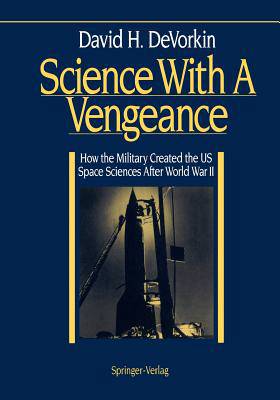
- Afhalen na 1 uur in een winkel met voorraad
- Gratis thuislevering in België vanaf € 30
- Ruim aanbod met 7 miljoen producten
- Afhalen na 1 uur in een winkel met voorraad
- Gratis thuislevering in België vanaf € 30
- Ruim aanbod met 7 miljoen producten
Zoeken
Science with a Vengeance
How the Military Created the Us Space Sciences After World War II
David H DeVorkin
€ 90,45
+ 180 punten
Omschrijving
The exploration of the upper atmosphere was given a jump start in the United States by German V-2 rockets - Hitler's "vengeance weapon" - captured at the end of World War II. The science performed with these missiles was largely determined by the missile itself, such as learning more about the medium through which a ballistic missile travels. Groups rapidly formed within the military and military-funded university laboratories to build instruments to investigate the Earth's upper atmosphere and ionosphere, the nature of cosmic radiation, and the ultraviolet spectrum of the Sun. Few, if any, members of these research groups had prior experience or demonstrated interests in atmospheric, cosmic-ray, or solar physics. Although scientific agendas were at first centered on what could be done with missiles and how to make ballistic missile systems work, reports on techniques and results were widely publicized as the research groups and their patrons sought scientific legitimacy and learned how to make their science an integral part of the national security state. The process by which these groups gained scientific and institutional authority was far from straightforward and offers useful insight both for the historian and for the scientist concerned with how specialties born within the military services became part of post-war American science.
Specificaties
Betrokkenen
- Auteur(s):
- Uitgeverij:
Inhoud
- Aantal bladzijden:
- 404
- Taal:
- Engels
- Reeks:
Eigenschappen
- Productcode (EAN):
- 9780387941370
- Verschijningsdatum:
- 11/11/1993
- Uitvoering:
- Paperback
- Formaat:
- Trade paperback (VS)
- Afmetingen:
- 179 mm x 255 mm
- Gewicht:
- 757 g

Alleen bij Standaard Boekhandel
+ 180 punten op je klantenkaart van Standaard Boekhandel
Beoordelingen
We publiceren alleen reviews die voldoen aan de voorwaarden voor reviews. Bekijk onze voorwaarden voor reviews.











